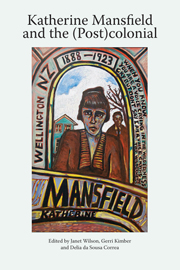Book contents
- Frontmatter
- Contents
- List of Illustrations
- Acknowledgements
- Colophon
- Introduction
- Criticism
- Katherine Mansfield: Cannibal
- Mansfield as (Post) colonial-Modernist: Rewriting the Contract with Death
- Colonialism and the Need for Impurity: Katherine Mansfield, ‘The Garden Party’ and Postcolonial Feeling
- ‘How Katherine Mansfield was Kidnapped’: A (Post) colonial Family Romance
- ‘Unmasking’ the First-Person Narrator of In a German Pension
- Workmanship and Wildness: Katherine Mansfield on Edith Wharton's The Age of Innocence
- Home and Abroad in the South Pacific: Spaces and Places in Robert Louis Stevenson and Katherine Mansfield's Short Fiction
- Literatures of Expatriation and the Colonial Mansfield
- Creative Writing
- Reports
- Reviews
- Notes on Contributors
- Katherine Mansfield Society
‘Unmasking’ the First-Person Narrator of In a German Pension
from Criticism
Published online by Cambridge University Press: 05 March 2014
- Frontmatter
- Contents
- List of Illustrations
- Acknowledgements
- Colophon
- Introduction
- Criticism
- Katherine Mansfield: Cannibal
- Mansfield as (Post) colonial-Modernist: Rewriting the Contract with Death
- Colonialism and the Need for Impurity: Katherine Mansfield, ‘The Garden Party’ and Postcolonial Feeling
- ‘How Katherine Mansfield was Kidnapped’: A (Post) colonial Family Romance
- ‘Unmasking’ the First-Person Narrator of In a German Pension
- Workmanship and Wildness: Katherine Mansfield on Edith Wharton's The Age of Innocence
- Home and Abroad in the South Pacific: Spaces and Places in Robert Louis Stevenson and Katherine Mansfield's Short Fiction
- Literatures of Expatriation and the Colonial Mansfield
- Creative Writing
- Reports
- Reviews
- Notes on Contributors
- Katherine Mansfield Society
Summary
When James Joyce left Ireland to ‘forge in the smithy of [his] soul the created conscience of [his] race’, he meant to escape the provincialism of the people he felt were holding him back as well as to separate the full sense of his heritage from the Empire that had brought its influence to bear on Ireland. The famous ‘tundish’ scene in A Portrait of the Artist as a Young Man reveals this interplay of influences between coloniser and the colonised. In the midst of a discussion on aesthetics with the dean – an ‘English convert’ and ‘a poor Englishman in Ireland’ – Stephen Dedalus reflects upon the cultural impact of language after the dean uses the word ‘funnel’ instead of the term, ‘tundish’:
The language in which we are speaking is his before it is mine. How different are the words home, Christ, ale, master, on his lips and on mine! I cannot speak or write these words without unrest of spirit. His language, so familiar and so foreign, will always be for me an acquired speech. I have not made or accepted his words. My voice holds them at bay. My soul frets in the shadow of his language.
Recognising the ‘nets flung at [the soul] to hold it back from flight’, Stephen – and by extension Joyce – attempts to escape these nets: ‘nationality, language, and religion’.
- Type
- Chapter
- Information
- Katherine Mansfield and the (Post)colonial , pp. 76 - 86Publisher: Edinburgh University PressPrint publication year: 2013



